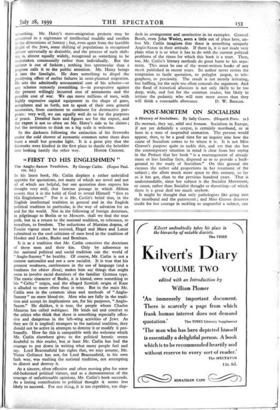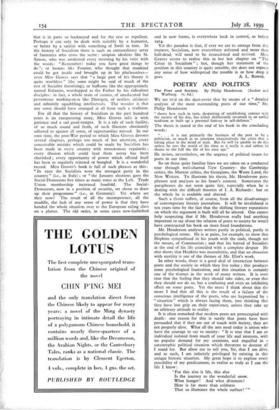POST-MORTEM ON SOCIALISM
A History of Socialism. By Sally Graves. (Hogarth Press. 5s.) De mortuis, they say, nihil nisi bonum. Socialism in Europe, if not yet definitely a corpse, is certainly moribund, or at least in a state of suspended animation. The present would appear, then, to be a good time for an inquiry into how the cause of Socialism comes to be where it is. It is not Miss Graves's purpose quite to tackle this, and yet that she has the contemporary situation in mind is clear from her saying in the Preface that her book "is a rearrangement of already more or less familiar facts, disposed so as to provide a back- ground to the study of Socialism." On this ground she excuses the rather odd proportions in her treatment of the subject ; she allots much more space to this century, so far as it has got, than to the previous hundred years. That is understandable, since her subject is the Socialist Movement, or cause, rather than Socialist thought or theorising—of which there is a great deal too much anyhow.
It might be thought that only pathologists like going into the moribund and the putrescent ; and Miss Graves deserves credit for her courage in tackling so ungrateful a subject, one
that is in parts so hackneyed and for the rest so repellent. Perhaps it can only be dealt with suitably by a humorist, or better by a satirist with something of Swift in him. In the history of Socialism there is such an extraordinary array of fantastics who cross the scene : utopian idealists like St. Simon, who was awakened every morning by his valet with the words : "Remember! today you have great things to do "; or loonies like Fourier, who thought that mankind could be got inside and brought up in his phalansteres- even Miss Graves says that "a large part of his theory is quite worthless" (the same might be said of much of the rest of Socialist theorising); or buffoons like the appropriately named Enfantin, worshipped as the Father by his ridiculous disciples : in fact, a whole train of comics, of uneducated but pretentious working-mm like Dietzgen, of restless declasses and infinitely squabbling intellectuals. The wonder is that any sense should have emerged at all from such a tradition.
For all that the history of Socialism in the past hundred years is an exasperating story, Miss Graves tells it with patience and a sad good-temper. It is a tale of such futility, of so much sound and froth, of such illusions obstinately adhered to against all sense, of opportunities missed. In our own time, the post-War period to which Miss Graves devotes several chapters, perhaps too much of her attention, every conceivable mistake which could be made by Socialists has been made in every country with monotonous regularity ; every illusion which could lead them astray has been cherished ; every opportunity of power which offered itself has been as regularly rejected or bungled. It is a wonderful record. Miss Graves's book is full of such phrases as this : "In 1920 the Socialists were the strongest party in the country" (i.e., in Italy) ; or "the January elections gave the Social-Democrats five times as many votes as the Left. Trade Union membership increased fourfold. The Social- Democrats, now in a position of security, set about to draw up their programme" (i.e., in Germany). Yet where are they now? The result of all the incompetence, all the muddle, the lack of any sense of power is that they have handed the whole situation over to the European ruling class on a platter. The old order, in some cases new-furbished and in new forms, is everywhere back in control, as before 1914.
Yet the paradox is that, if ever we are to emerge from this impasse, Socialism, now everywhere defeated and more than half-dead, will need to be resuscitated and revived. Mis Graves seems to realise this in her last chapter on "The Crisis in Socialism " ; but, though her statement of the position in this country is quite sensible, she does not express any sense of how widespread the trouble is or how deep it









































 Previous page
Previous page